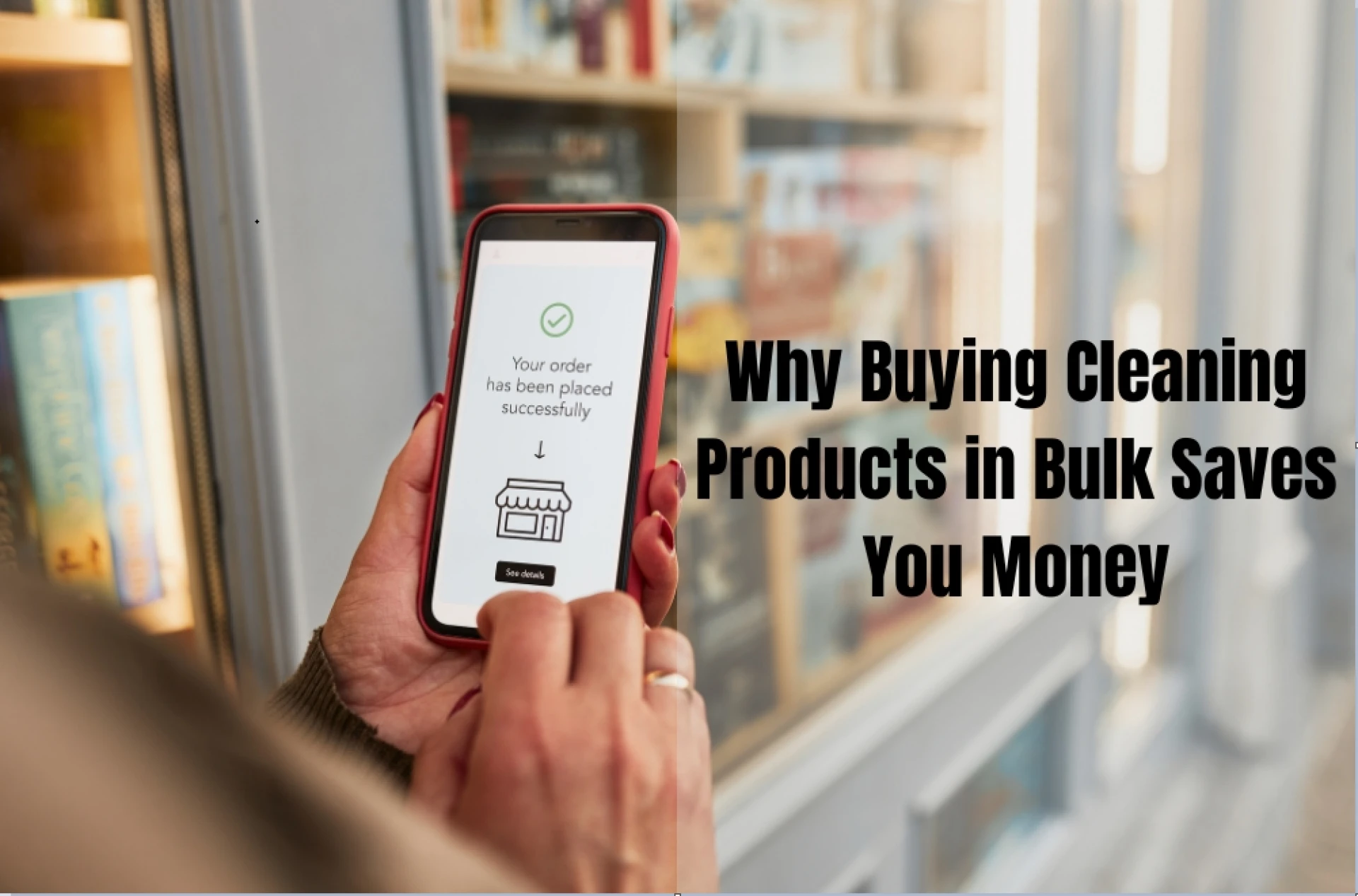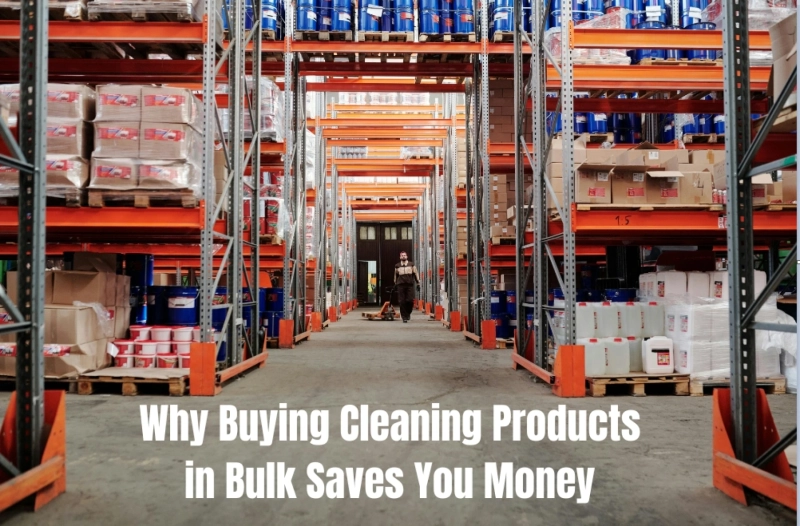If you run a business, manage a cleaning crew, or even just have a busy household, you probably go through a lot of cleaning products. And if you’ve found yourself making constant trips to restock, you’ve likely wondered: Would it be smarter to buy in bulk?
Short answer? In most cases, absolutely.
Over the years, I’ve worked with everyone from café owners to large cleaning companies, and one thing they all agree on: buying cleaning products in bulk isn’t just convenient — it can seriously cut costs.
But like anything, there are smart ways to approach it. In this post, I’ll break down why bulk buying makes sense — and how to do it well.
1️⃣ Lower cost per unit
Let’s start with the obvious: buying in larger quantities usually means a lower price per unit.
✅ It saves them on packaging
✅ It reduces shipping frequency
✅ It moves more product at once
For example, a single bottle of all-purpose cleaner might cost $5 on the shelf, but buy a 5-litre container and your per-litre cost could drop by 40–60%.
Multiply that saving across multiple products (disinfectants, degreasers, hand soap, paper products), and the totals add up.
2️⃣ Fewer shipping or delivery fees
If you’re ordering online or getting products delivered, bulk buying can also cut your delivery costs.
Instead of paying $10–15 per order multiple times a month, consolidating into fewer, larger orders can reduce fees or even unlock free shipping thresholds.
I had a café client who switched to monthly bulk orders and saved over $300 a year in shipping fees alone.
3️⃣ Less time spent shopping and managing stock
Time is money — especially for small business owners or busy families.
Running out of cleaning supplies mid-week means:
- Extra trips to the store
- More staff hours spent on errands
- Interruptions to your cleaning routines
With a well-planned bulk buying system, you can keep enough on hand to avoid these disruptions. One of my commercial cleaning clients now orders once a month instead of weekly, freeing up hours for more productive tasks.
4️⃣ Better alignment with workplace compliance
If you manage staff or run a business, keeping your cleaning supplies well-stocked and properly labelled helps with compliance too.
For example, buying bulk commercial cleaning equipment or concentrates often comes with better documentation — SDS (Safety Data Sheets), dilution instructions, and usage guidelines.
This supports:
✅ Safe chemical storage
✅ Staff training requirements
✅ Compliance with workplace health and safety standards
In short, it’s easier to stay on top of legal and safety obligations when you buy thoughtfully in bulk.
5️⃣ Eco-friendly benefits
Bulk buying also tends to be greener:
- Less packaging waste
- Fewer transport emissions
- Lower energy use per unit shipped
If you’re trying to make your business or home more sustainable, bulk is a simple switch that reduces your environmental footprint.
How to choose the right products to buy in bulk
Not everything is suited for bulk buying, especially products with short shelf lives.
Here’s my rule of thumb:
✅ Great for bulk buying:
- Surface cleaners
- Disinfectants
- Floor cleaners
- Glass cleaner
- Hand soap
- Paper towels and toilet paper
⚠️ Use caution:
- Specialty products you use infrequently
- Items with short shelf lives or sensitive formulations
Pro tip: start with your top 5 most-used items — test how quickly you go through them and adjust order sizes from there.
Planning your bulk purchasing
Ready to get started? Here’s a simple process I share with clients:
1️⃣ Track usage for a month — note what you’re going through
2️⃣ Estimate reorder cycles — e.g., enough stock for 1–3 months
3️⃣ Choose a supplier with reliable stock — consistency matters more than chasing the cheapest deal
4️⃣ Set a regular ordering schedule — monthly or quarterly works well for most small businesses
5️⃣ Review periodically — adjust as your needs change
I also recommend reading cleaning products wholesale guides to learn from others in your industry — there are great tips out there on bulk sourcing and storage.
Storage tips for bulk cleaning products
One potential downside of bulk buying is storage, but with a little planning, it’s easy to manage.
✅ Use labelled, sealed containers for easy dispensing
✅ Store away from direct sunlight and extreme temperatures
✅ Keep flammable products in compliance with safety guidelines
✅ Maintain clear records for staff reference
If space is tight, focus on concentrates — they give the same cost advantages without taking up as much room.
Common mistakes to avoid
Even experienced buyers sometimes fall into these traps:
❌ Buying too much — stockpiling more than you can use before expiry
❌ Chasing the cheapest price — ignoring product quality or service
❌ Failing to rotate stock — older products get forgotten at the back of the shelf
❌ Skimping on staff training, especially if switching to concentrated products
Remember — bulk should simplify, not complicate your cleaning operations.
What about bulk cleaning supplies advice online?
You’ll find plenty of blogs and articles about bulk cleaning supplies, and many are helpful.
✅ Local regulations vary (especially around chemical storage)
✅ Not all "eco-friendly" claims are equal — look for certifications
✅ Shipping costs can erase savings if you’re not careful — factor them in
Stick to trusted suppliers and government guidelines for anything related to workplace compliance or chemical safety.

Final thoughts
In my experience, buying cleaning products in bulk is one of the easiest ways for businesses — and even busy households — to save money and streamline operations.
You’ll cut costs on the products themselves, reduce delivery fees, save time managing inventory, and stay better aligned with safety standards.
Just start small: track your usage, focus on your most-used products, and build a system that works for your space and needs.
Before long, you’ll wonder why you ever did it any other way.
And if you’re still on the fence? Try this: for your next restock, order just one or two items in bulk — see how it goes. Chances are, you’ll be hooked on the convenience (and the savings).



